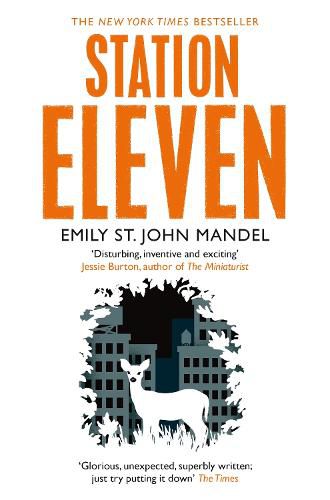Readings Newsletter
Become a Readings Member to make your shopping experience even easier.
Sign in or sign up for free!
You’re not far away from qualifying for FREE standard shipping within Australia
You’ve qualified for FREE standard shipping within Australia
The cart is loading…






Winner of the Arthur C Clarke award for science fiction
Longlisted for the Bailey’s Prize 2015
The New York Times Bestseller 2014
National Book Awards Finalist 2015
PEN/Faulkner Award Finalist
What was lost in the collapse: almost everything, almost everyone, but there is still such beauty.
One snowy night in Toronto famous actor Arthur Leander dies on stage whilst performing the role of a lifetime. That same evening a deadly virus touches down in North America. The world will never be the same again.
Twenty years later Kirsten, an actress in the Travelling Symphony, performs Shakespeare in the settlements that have grown up since the collapse. But then her newly hopeful world is threatened. If civilization was lost, what would you preserve? And how far would you go to protect it?
$9.00 standard shipping within Australia
FREE standard shipping within Australia for orders over $100.00
Express & International shipping calculated at checkout
Winner of the Arthur C Clarke award for science fiction
Longlisted for the Bailey’s Prize 2015
The New York Times Bestseller 2014
National Book Awards Finalist 2015
PEN/Faulkner Award Finalist
What was lost in the collapse: almost everything, almost everyone, but there is still such beauty.
One snowy night in Toronto famous actor Arthur Leander dies on stage whilst performing the role of a lifetime. That same evening a deadly virus touches down in North America. The world will never be the same again.
Twenty years later Kirsten, an actress in the Travelling Symphony, performs Shakespeare in the settlements that have grown up since the collapse. But then her newly hopeful world is threatened. If civilization was lost, what would you preserve? And how far would you go to protect it?
There’s an outbreak of the flu. The virus is airborne, highly contagious, and kills almost everyone who contracts it. Within a week, the world as we know it is gone. This is the premise underlying Station Eleven, the fourth novel from Emily St. John Mandel. Mandel takes a well-worn dystopian trope and re-imagines it in a decidedly literary fashion. Station Eleven dances back and forth in time, skipping from the period before the flu outbreak to the days, months and years after. The novel never settles too long on a single person, instead drawing loose connections between a wide range of characters, exploring themes from loneliness to the meaning of celebrity.
A large section of the novel is set 20 years after the outbreak. It follows a group of actors and musicians called the Travelling Symphony who move between small settlements, performing Shakespeare. Their motto is ‘survival is insufficient’, and they aim to bring a sense of joy back into the broken world. Their existence is relatively happy, peaceful and safe – until suddenly, one day, it isn’t.
The chapters featuring the Travelling Symphony are utterly gripping. The novel’s only weakness is that it abruptly moves from these tension-filled sections to the smaller, quieter stories set in the world before the outbreak. The pre-flu narratives are vastly overshadowed by the exciting conflicts Mandel sets in motion post-outbreak, where people are struggling to survive in a lawless world without electricity or modern resources.
Station Eleven has echoes of The Passage and The Walking Dead (minus the vampires and zombies). But Mandel always draws the novel back towards her particular concerns of survival, family, community, the enduring nature of literature, and what it means when our very global, connected world shrinks backwards: ‘No more Internet. No more social media, no more scrolling through litanies of dreams and nervous hopes and photographs of lunches, cries for help and expressions of contentment and relationship-status updates …’ Smart, haunting and inventive, Station Eleven is highly recommended.
See what the Readings’ team have to say on the blog, discover related events and podcast episodes.
To mark the first 25 years of the century, The New York Times Book Review sent a survey to hundreds of literary luminaries, asking them name the 10 best books published since Jan 1, 2000. They tallied the votes to come up with their list of The 100 Best Books of the 21st Century, and here they are!